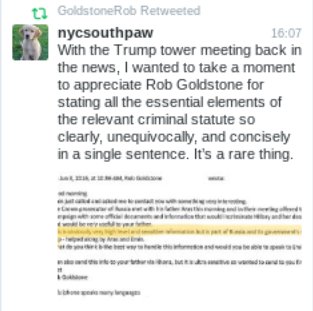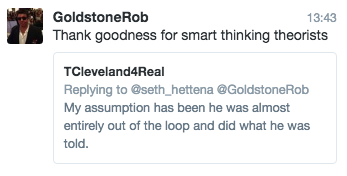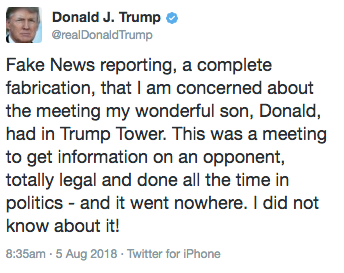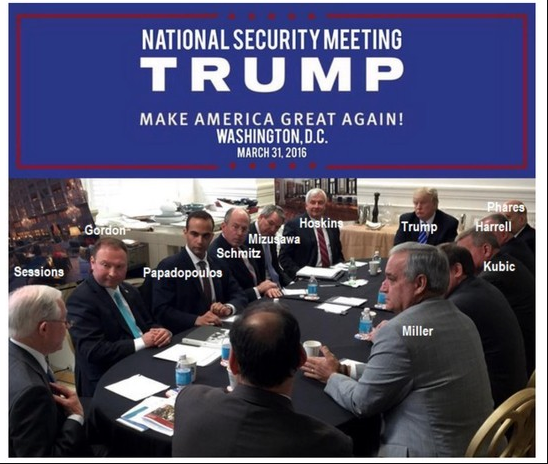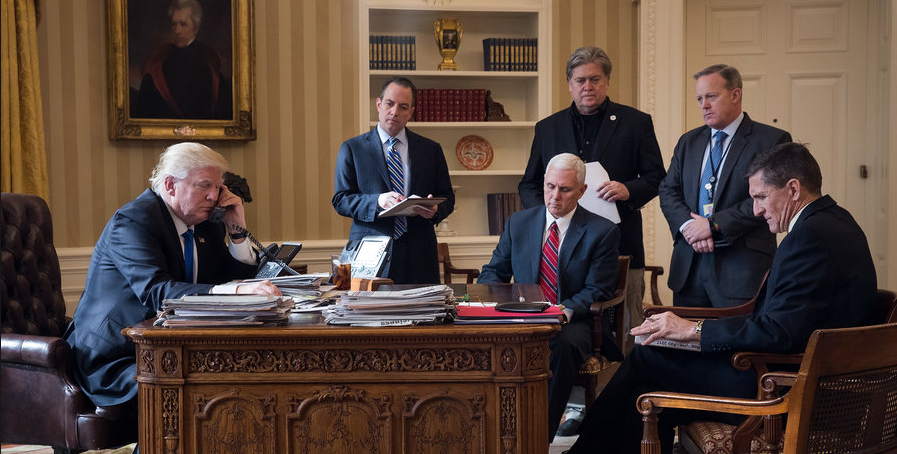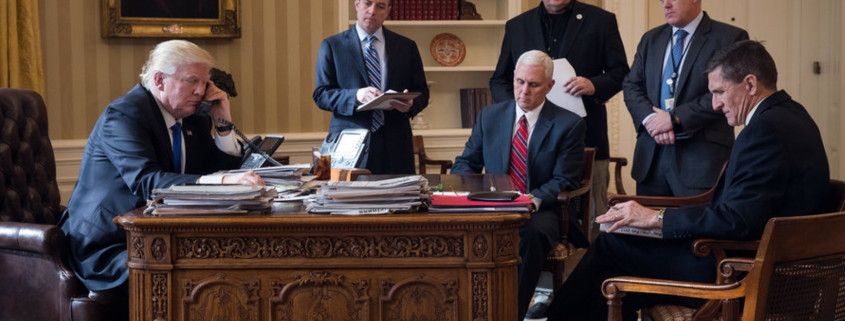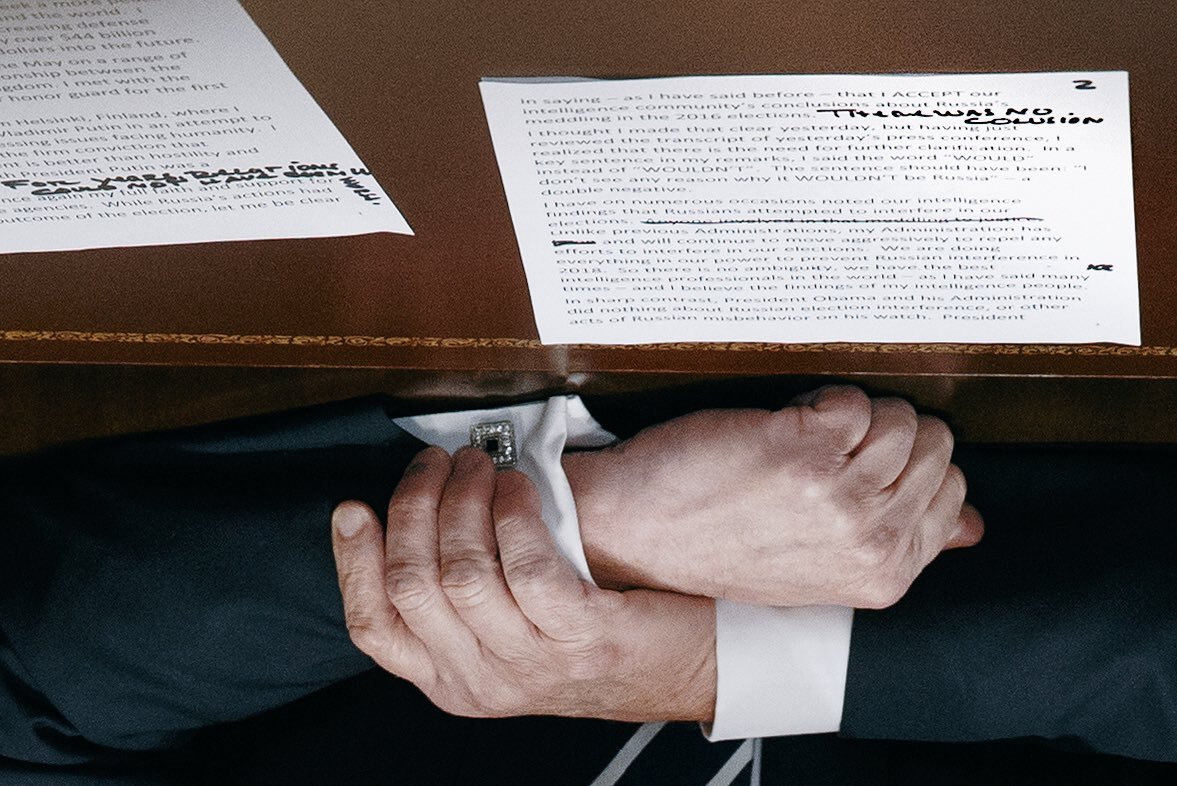As I disclosed last month, I provided information to the FBI on issues related to the Mueller investigation, so I’m going to include disclosure statements on Mueller investigation posts from here on out. I will include the disclosure whether or not the stuff I shared with the FBI pertains to the subject of the post.
Back in June, Eric Trump made news when he claimed that, “My father’s life became exponentially worse the minute he decided to run for president.”
That’s not yet clear — though I think it possible that conspiring with Russians to get elected may yet bring down the Trump empire and put at least one of his family members in prison.
The case may be easier to make for Paul Manafort however. As evidence laid out in his trial has made clear this week, it is true that when Viktor Yanukovych was ousted in Ukraine, he started going broke. Yet somehow, he tried to trade up the oligarch ladder, to do for Donald Trump what he had done for his Russian client in Ukraine. In doing so, however, Manafort made himself far more vulnerable to having his influence peddling and corruption exposed.
In August 2016, things started to fall apart. That’s a story increasingly told in the collective legal proceedings revealed by the Mueller inquiry.
First, recall that the Mueller team appears to have the communications between Manafort and Konstantin Kilimnik since March 2016, as this spreadsheet that appears to show a parallel constructed source of such communications suggests.
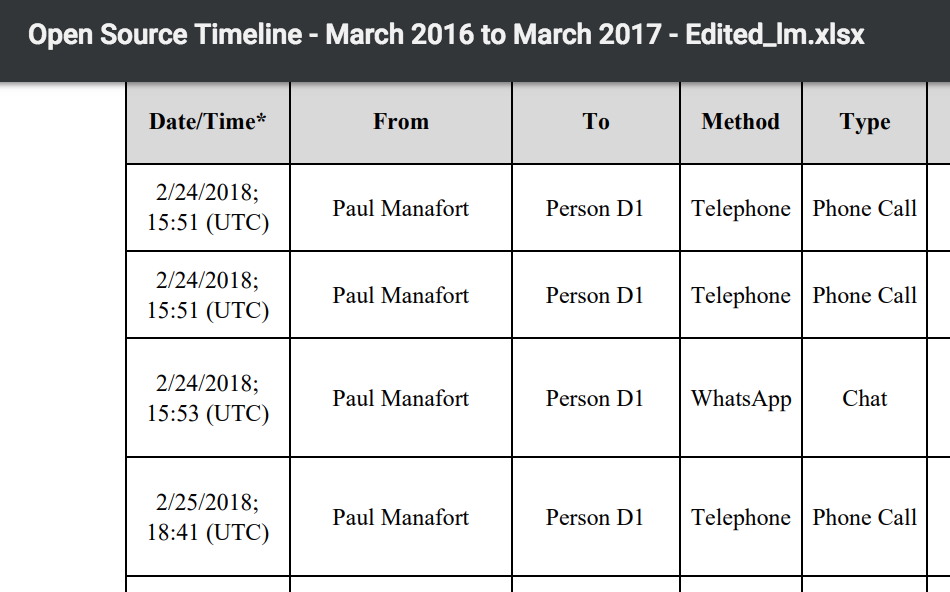
That would suggest the government has a good deal of background on the two meetings Kilimnik and Manafort had during the campaign, including the one that took place on August 2.
In August, as tension mounted over Russia’s role in the U.S. presidential race, Donald Trump’s campaign chairman, Paul Manafort, sat down to dinner with a business associate from Ukraine who once served in the Russian army.
Konstantin Kilimnik, who learned English at a military school that some experts consider a training ground for Russian spies, had helped run the Ukraine office for Manafort’s international political consulting practice for 10 years.
At the Grand Havana Room, one of New York City’s most exclusive cigar bars, the longtime acquaintances “talked about bills unpaid by our clients, about [the] overall situation in Ukraine . . . and about the current news,” including the presidential campaign, according to a statement provided by Kilimnik, offering his most detailed account of his interactions with the former Trump adviser.
[snip]
Kilimnik said his meetings with Manafort were “private visits” that were “in no way related to politics or the presidential campaign in the U.S.” He said he did not meet with Trump or other campaign staff members, nor did he attend the Republican National Convention, which took place shortly before the Grand Havana Room session. However, he said the meetings with Manafort included discussions “related to the perception of the U.S. presidential campaign in Ukraine.”
Meanwhile, as much of the evidence presented in Manafort’s EDVA case last week makes clear, he was in deep financial trouble. That’s why, prosecutors allege, he submitted fraudulent numbers to get loans fromThe Federal Savings Bank of Chicago and Citizen’s Bank, among other banks. Next week, prosecutors will probably present exhibits 268 and 269, emails to an employee, Dennis Raico (who will be granted immunity if he testifies) of TFSBC asking for the professional details of his boss, Stephen Calk. (h/t pinc)
268 2016.08.03 Email D. Raico to P. Manafort re Need S. Calk Resume
269 2016.08.04 Email P. Manafort to S. Calk re S. Calk- Professional Bio
The next day, Trump named Calk to his financial advisory committee.
Last week, prosecutors showed that, on August 10, Manafort told his tax preparer, Cindy LaPorta, that she should claim he’d be paid $2.4 million for work in Ukraine in November. (h/t NYCSouthpaw for this observation)
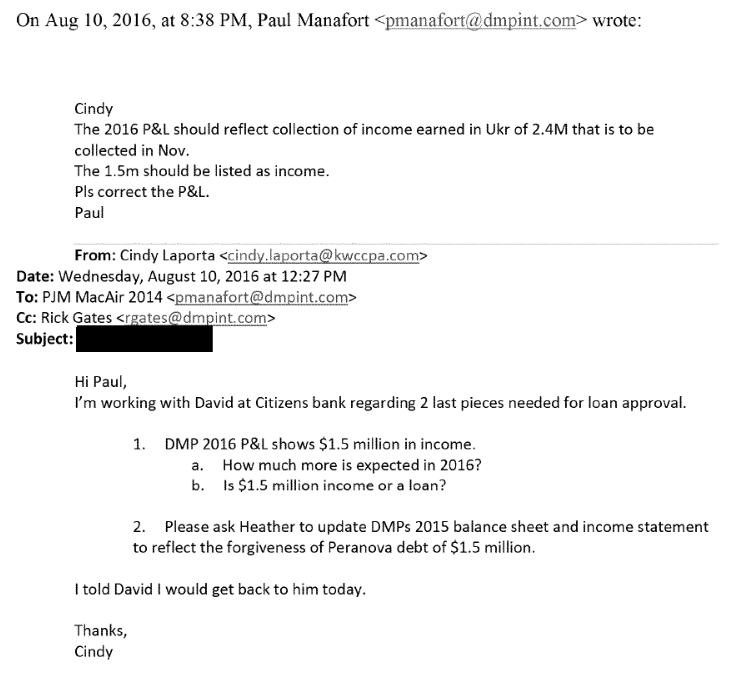
Even as he was allegedly engaging in bank fraud to stay afloat, Manafort (and his daughter) would get what appear to be blackmail attempts — threats to release details of his corrupt actions in Ukraine — details of which were later leaked on the dark web.
A purported cyberhack of the daughter of political consultant Paul Manafort suggests that he was the victim of a blackmail attempt while he was serving as Donald Trump’s presidential campaign chairman last summer.
The undated communications, which areallegedly from the iPhone of Manafort’s daughter, include a text that appears to come from a Ukrainian parliamentarian named Serhiy Leshchenko, seeking to reach her father, in which he claims to have politically damaging information about both Manafort and Trump.
Attached to the text is a note to Paul Manafort referring to “bulletproof” evidence related to Manafort’s financial arrangement with Ukraine’s former president, the pro-Russian strongman Viktor Yanukovych, as well as an alleged 2012 meeting between Trump and a close Yanukovych associate named Serhiy Tulub.
[snip]
In a Tuesday interview, Manafort denied brokering a 2012 meeting between Trump and Tulub and also pointied out that he wasn’t working for Trump at the time.
However, Manafort did confirm the authenticity of the texts hacked from his daughter’s phone. And he added that, before the texts were sent to his daughter, he had received similar texts to his own phone number from the same address appearing to be affiliated with Leshchenko.
He said he did not respond directly to any of the texts, and instead passed them along to his lawyer. He declined to provide the texts to POLITICO.
[snip]
Manafort said that the first of the texts arrived shortly before The New York Times published an August exposé revealing that the National Anti-Corruption Bureau of Ukraine had obtained documents — which have since come under scrutiny — that appeared to show $12.7 million in cash payments earmarked for Manafort.
That NYT story came out on August 14, just 3 days after he promised a bank he had millions more coming from Ukraine around the same time as the presidential election. The very next day, the AP would pile on, asking for comment on a story about Manafort’s undisclosed lobbying for Yanukovych that it would publish on August 17. As prosecutors pointed out in a filing in the DC case, this exchange with the AP — and the Manafort-Gates effort to sustain a lie about their lobbying campaign — is a big part of the reason they lied when DOJ asked them to register under FARA that fall.
For example, on August 15, 2016, a member of the press e-mailed Manafort and copied a spokesperson for the Trump campaign to solicit a comment for a forthcoming story describing his lobbying. Gates corresponded with Manafort about this outreach and explained that he “provided” the journalist “information on background and then agreed that we would provide these answers to his questions on record.” He then proposed a series of answers to the journalist’s questions and asked Manafort to “review the below and let me know if anything else is needed,” to which Manafort replied, in part, “These answers look fine.” Gates sent a materially identical message to one of the principals of Company B approximately an hour later and “per our conversation.” The proposed answers Gates conveyed to Manafort, the press, and Company B are those excerpted in the indictment in paragraph 26.
An article by this member of the press associating Manafort with undisclosed lobbying on behalf of Ukraine was published shortly after Gates circulated the Manafort-approved false narrative to Company B and the member of the press. Manafort, Gates, and an associate of Manafort’s corresponded about how to respond to this article, including the publication of an article to “punch back” that contended that Manafort had in fact pushed President Yanukovych to join the European Union. Gates responded to the punch-back article that “[w]e need to get this out to as many places as possible. I will see if I can get it to some people,” and Manafort thanked the author by writing “I love you! Thank you.” Manafort resigned his position as chairman of the Trump campaign within days of the press article disclosing his lobbying for Ukraine.
Manafort’s role with the Trump campaign is thus relevant to his motive for undertaking the charged scheme to conceal his lobbying activities on behalf of Ukraine. Here, it would be difficult for the jury to understand why Manafort and Gates began crafting and disseminating a false story regarding their Ukrainian lobbying work nearly two years after that work ceased—but before any inquiry by the FARA Unit—without being made aware of the reason why public scrutiny of Manafort’s work intensified in mid-2016. Nor would Manafort’s motives for continuing to convey that false information to the FARA Unit make sense: having disseminated a false narrative to the press while his position on the Trump campaign was in peril, Manafort either had to admit these falsehoods publicly or continue telling the lie.
The day the article came out, August 17, Trump gave Steve Bannon and Kellyanne Conway larger roles in the campaign. Two days later, Manafort would resign, though he would remain in the loop with Trump. Indeed, according to the hacked texts from his daughter, he remained involved and actually “hired [Bannon and Conway]. Interviewed them in trump towers.” (h/t ee)
But according to leaked texts allegedly hacked from the phone of his daughter Andrea Manafort Shand, Manafort’s resignation was all for show, and he continued to wield influence in the campaign.
On August 19, when Paul Manafort officially resigned, the allegedly hacked texts show that Manafort Shand wrote to one her contacts:
So I got to the bottom of it, as I suspected my dad resigned from being the public face of the campaign. But is still very much involved behind the scenes.
He felt he was becoming a distraction and that would ultimately take a toll on the campaign.
Several hours later, a different contact appears to have texted Andrea Manafort to say, “Thoughts go out to your pops—I can only imagine that he’s relieved, angry, hurting, a combination of a lot of emotions. Wishing you and your fam the best.” To which Andrea responded: “Hahaha you’re so silly. It’s all just pr.”
But — as the Mueller filing makes clear — the pushback on the AP and NYT stories didn’t end Manafort and Gates’ efforts to lie about their activities in Ukraine. A filing in the Alex van der Zwaan prosecution details that on September 12, 2016, in the wake of the Kyiv Post’s exposure of new details about this work (h/t ms), Kilimnik would contact van der Zwaan, leading to a series of communications between the two of them and Skadden Arps’ Greg Craig regarding how Manafort and Gates laundered money and its sources to pay Skadden for a report on Yulia Tymoshenko’s prosecution.
Instead of truthfully answering questions about his contacts with Gates and Person A, van der Zwaan lied. He denied having substantive conversations with Gates and Person A in 2016. When confronted with an email dated September 12, 2016, sent by Person A to van der Zwaan, the defendant again lied. The email was sent to the defendant’s email address at his law firm, though the Special Counsel’s Office had obtained the email from another source. The email said, in Russian, that Person A “would like to exchange a few words via WhatsApp or Telegram.” van der Zwaan lied and said he had no idea why that email had not been produced to the government, and further lied when he stated that he had not communicated with Person A in response to the email.
[snip]
Further, van der Zwaan in fact had a series of calls with Gates and Person A—as well as the lead partner on the matter—in September and October 2016. The conversations concerned potential criminal charges in Ukraine about the Tymoshenko report and how the firm was compensated for its work. The calls were memorable: van der Zwaan had taken the precaution of recording the conversations with Gates, Person A, and the senior partner who worked on the report. In van der Zwaan’s recorded conversation with Person A, in Russian, Person A suggested that “there were additional payments,” that “[t]he official contract was only a part of the iceberg,” and that the story may become a blow for “you and me personally.”
[snip]
Federal Bureau of Investigation Special Agents assisting the Special Counsel’s Office assess that Person A has ties to a Russian intelligence service and had such ties in 2016. During his first interview with the Special Counsel’s Office, van der Zwaan admitted that he knew of that connection, stating that Gates told him Person A was a former Russian Intelligence Officer with the GRU.
These are the contacts van der Zwaan hid, at first, from Mueller’s investigators. Van der Zwaan would claim he wasn’t hiding those contacts because he knew Kilimnik was a former GRU officer, but instead to hide that he recorded the conversation with Craig from the Skadden lawyers who represented him in the first interview with the FBI. But it’s still not clear why he made the recording. It sure feels like blackmail to me, though may also have been an effort to stay on track on his quest to make partner at Skadden (remember that van der Zwaan was being romanced into the family of Alfa Bank founder German Khan during 2016; he would marry Khan’s daughter in 2017).
Indeed, Paul Manafort’s life looks like a series of blackmail attempts during that period.
Which makes the stakes of the question Carrie Johnson asked in her Manafort trial round-up all the greater.
Left unanswered so far, Scott, is why Manafort joined the Trump campaign in 2016 for no money when he was bleeding. He was bleeding money and got no salary from that Trump campaign.
Why was Manafort, badly underwater at the time, willing to work for Trump for “free”? What was the $2.4 million he expected to be paid in November for?
And given all the publicly known things Manafort did out of desperation at the time, what kind of non-public desperate things could he also be coerced into doing?
Update: Added the Kyiv Post and Andrea Manafort details.
Update: Added Calk and TFSBC details.
Timeline
August 2: Manafort has an in-person meeting with Kilimnik where they discussed “the perception of the U.S. presidential campaign in Ukraine”
August 3: Manafort asks Dennis Raico for the resume of his boss, Stephen Calk
August 4: Manafort asks Raico for Calk’s professional biography
August 5: Trump named Calk to his financial advisory committee
August 10: To obtain a fraudulent bank loan, Manafort tells his tax preparer to claim $2.4 million in payments from Ukraine for which he had no documentation
Before August 14: Manafort is blackmailed, allegedly by Ukrainian politician Serhiy Leshchenko
August 14: NYT publishes “Secret Ledger in Ukraine Lists Cash for Donald Trump’s Campaign Chief”
August 15: In advance of an AP story on their undisclosed lobbying, Manafort and Gates work out a false story with Mercury Consulting and the Podesta Group
August 17: AP publishes “Paul Manafort helped a pro-Russia political party in Ukraine secretly route at least $2.2M to DC lobbyists”; Trump gives Bannon and Conway larger roles in the campaign
August 19: Manafort resigns from campaign
September 12: Kilimnik contacts van der Zwaan regarding cover-up regarding payments to Skadden Arps


